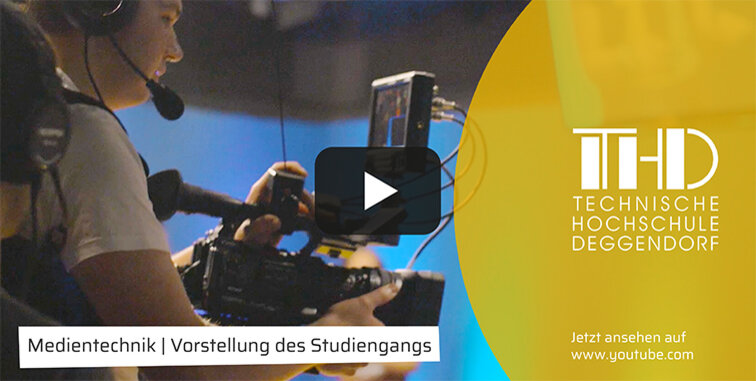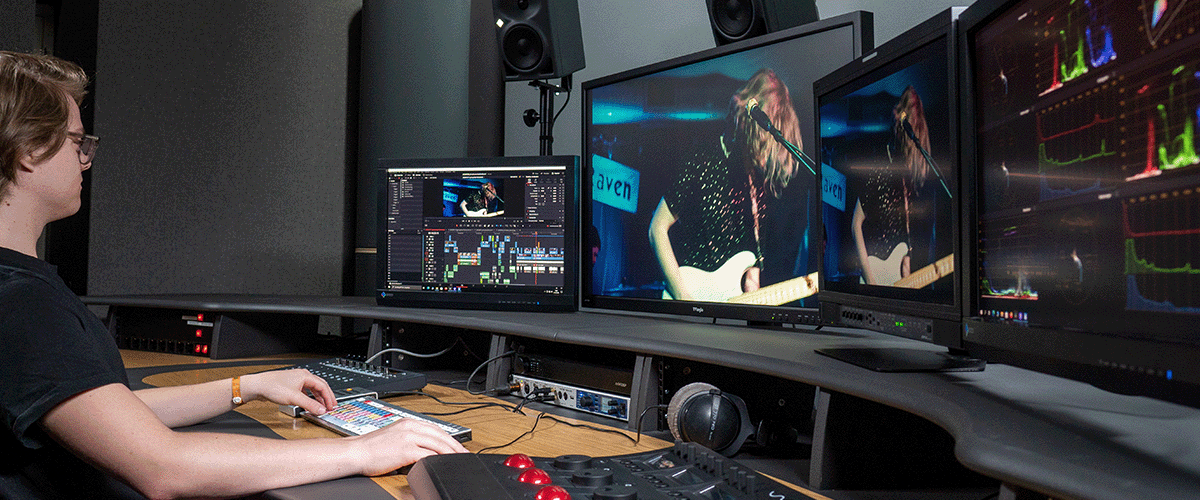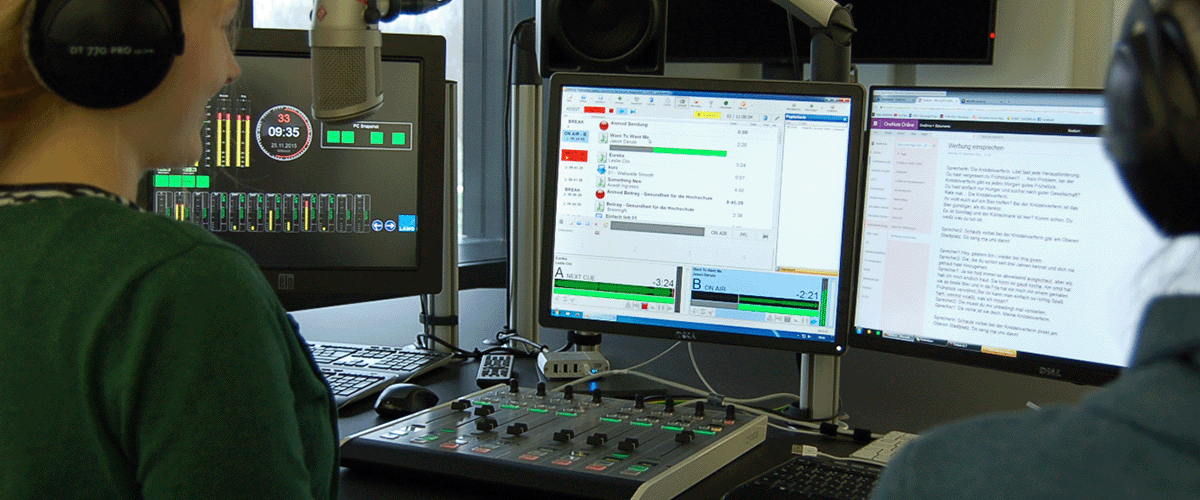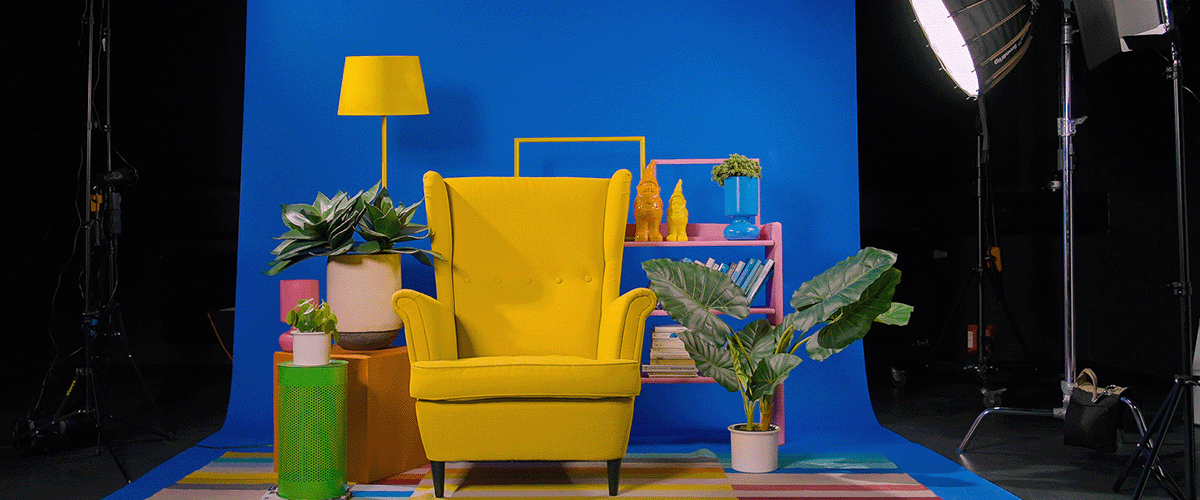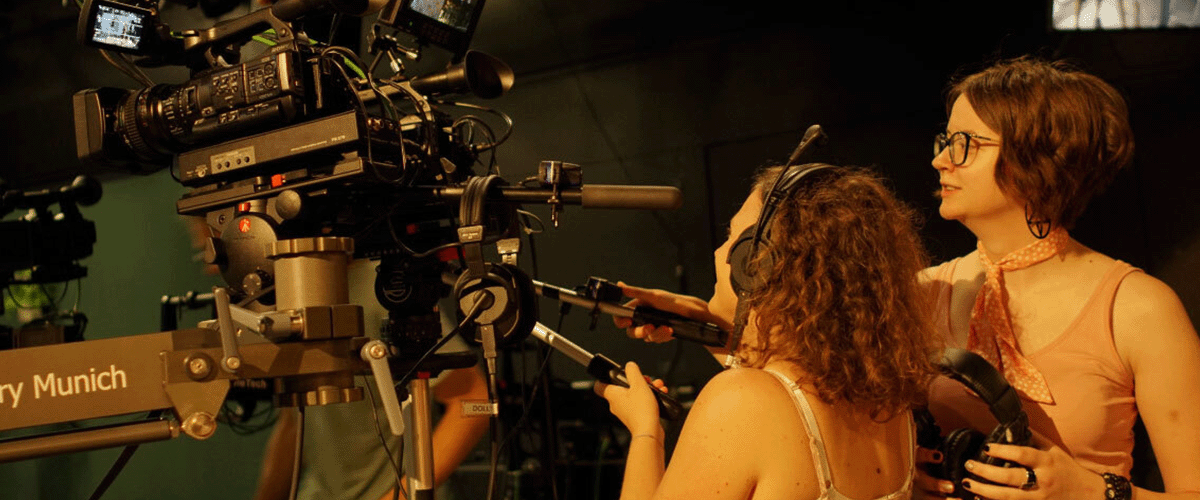Advance Tomorrow's Technology
Become an Expert in Fields of Technology & Engineering
We provide support for internships, starting a job in a company, or setting up your own business

Shape the media world
Whether camera work, digital media productions, 3D visualisations, lighting technology or interactive real-time XR applications: The Bachelor's degree programme in Media Technology at Deggendorf Institute of Technology will equip you with the technical skills and creative know-how to develop and implement the multimedia content of tomorrow. Designing brands, media experiences, communication spaces and lighting designs - you can do it all!
Become a sought-after media professional with a broad understanding of technologies, production processes and design possibilities. Combine digital media technologies with design and creative application in the fields of virtual reality, light, sound, video and interactive during your studies at DIT.
Get to know the entire spectrum of the media world and its various technologies - strongly project- and practice-orientated. You will learn the technical basics in the foundation programme. You will learn how media is systematically structured and technically implemented. You will learn the basics of media technology, lighting and illumination technology, signal transmission and interactive media. From day one of your studies, you will put your knowledge into practice in your own projects using state-of-the-art technology, working in the TV, radio and photo studio or designing together in a team. These valuable experiences will bond you for life and make the media technology community so special. You then have the opportunity to deepen your personal area of interest - by choosing a specialisation, in an internship, in elective subjects or in your Bachelor's thesis.
This broad foundation opens up a wide range of career opportunities in the media industry. Would you like to deepen your knowledge even further? At DIT, you can easily add on a Master's programme in Media Technology. Specialise specifically, for example in advanced audio or video production, event production and 3D animation, psychoacoustics, lighting technology and design, extended reality, the design of audiovisual systems or deepen your film knowledge in artistic short film. Are you interested in event production, lighting technology and lighting design? You can also gain an insight into the exciting world of facial animation and extended reality in the Master's in Media Technology.
fact sheet media technology
Degree: Bachelor of Engineering (B.Eng.)
Duration: 7 semesters (3.5 years)
ECTS points: 210
Start: October (winter semester)
Location: Deggendorf
Taught in: German
Application period: 15 April - 15 September
Admission requirements:
- General German university entrance qualification, or please check your eligibilty at the DAAD if you own an international qualification
- Language requirements
Prerequisites: Knowledge of basic scientific subjects and technical interest are of great advantage
Consolidation and specialisation: Media Production and Media Engineering
Postgraduate opportunities:
- Master Applied Informatics/Infotronics
- Master Applied Research in Engineering Sciences
- Master Electrical Engineering and Information Technology
- Master Electromobility
- Master Media Technology
Fees:
- No tuition fees, only student union fee
- International students from non-EU/EEA countries are required to pay service fees for each semester. Click here to read about our service fees.
Contact: Prospective student advisors
Career prospects
The Media Technology course trains engineers who are capable of acting independently and responsibly in companies and society. Scientific engineering methods, technical skills and knowledge are combined with knowledge of media culture, the basics of media design and important aspects of content as well as generally important elements of business management such as project management and business administration. The media technician thus assumes very important, integrating functions in the company by combining computer science with content, technology with design and products with ergonomics.
Career opportunities are available in all areas in which media are used and produced.
It is not only media enterprises such as film and broadcasting companies, but many other business enterprises, which work in the field of Communication, Entertainment and Internet Presentation, that use media technicians. The public service sector as well as self-employment offer further development opportunities. Especially because of their diverse and integrating way of working, media technicians also occupy numerous niche positions in the field of:
- Automotive industry
- HiFi- and TV - Industry
- Device development
- Third-party services
Technical, productive or economic activities in the media sector:
- Video and Television Journalist
- Managerial Position in Production and Recording
- Audio and Video Engineer
- Television editor
- Desktop publisher
- Web developers and designers
- Advertising designer
- Media "all-rounders" in the film and broadcasting industry
Activities in many other technical fields:
- Research and development in the automotive industry
- Research and development in the entertainment industry
- Development in the equipment industry (sound design)
The course of studies should enable students to carry out engineering activities in the following fields:
- Design and Development
- TV- and Audio Production
- Engineering and Quality Management
- Project Planning and Management
- Digital Marketing
- Customer Service and Consulting
- Technical Editing and Management
- Studio Technology and Metrology
- Monitoring and appraisal
- R&D in the automotive, entertainment or equipment sector
- Independent order processing
- Virtual production
Structure of the study programme
The study of media technology comprises seven semesters, including a practical semester (20 weeks of industrial internship). A pre-study internship before the start of the course and a basic internship during the semester breaks is not mandatory, but is recommended in order to gain an insight into later professional life as early as possible.
The programme is very broadly based and consists of five semesters of lectures and the practical semester, which must also be completed by graduates of BOS or FOS. In the seventh semester, students mainly write their Bachelor's thesis, which is usually carried out in a media institute or media company or can also be written in the well-equipped laboratories of the university.
Basic study programme (1st - 3rd semester)
The first part of your degree programme provides you with a solid foundation in technical, creative and scientific areas. You will immerse yourself in the mathematical and physical fundamentals of media technology - important in order to really understand technical systems and processes. You will also acquire knowledge in image and camera technology, lighting and illumination technology, sound technology, signal processing and computer science. This will enable you to technically realise media content.
At the same time, you will develop your creative side: in modules such as design, animation or film/video design, you will learn how to conceptualise and implement visual and audiovisual content.
In addition to the technical aspects, the foundation degree programme offers you plenty of scope for personal development. The interdisciplinary structure and the freedom between modules help you to find your own path. The strong practical focus - for example in the form of projects and internships - means that theory is directly linked to real-life applications. This means you are ideally prepared for specialisation in the later phases of your studies.
Consolidation and specialisation (4th - 7th semester)
In this phase of your degree programme, you decide on a specialisation: you either focus on the creative and design production of media content (Media Production) or on the technical development and function of modern media technologies (Media Engineering). Both focus areas offer you the opportunity to expand your specialist knowledge and specialise in innovative subject areas.
But it's not just about the technical aspects: You will strengthen your project management skills, improve your analytical thinking and learn to implement complex ideas together with others in interdisciplinary teams.
With the work placement and the Bachelor's thesis, you will gain important practical experience, develop a clearer picture of your professional goals - and at the same time become more independent and responsible. You will learn how to utilise and develop your own talents and interests in a targeted manner - for a career path that really suits you.
This study phase therefore not only offers you in-depth technical knowledge, but also the opportunity to develop personally and prepare you step by step for your entry into professional life.
The following modules give you the opportunity to specialise and deepen your knowledge in a targeted manner:
- 3D character animation
- Audio applications
- Brand design
- Interactive media
- Internet radio
- Specialisation in studio production
- Applications of immersive media
- Audiovisual systems
- Innovative media technologies
- Lighting technology, simulation and virtualisation
- Projection and display technology
- Software engineering
Subject Overview
Overview of the courses, SWS (semester hours per week) and ECTS (European Credit Transfer and Accumulation System) of the Bachelor's degree Media Technology.
| 1. Semester | SWS | ECTS |
|
Mathematics for Media Technology 1 |
4 | 5 |
|
Technical Foundations of Media Technology |
6 | 7 |
|
Media Mechanics |
4 | 5 |
|
Introduction to Programming |
4 | 5 |
|
Design Basics 1 |
4 | 5 |
|
Academic Writing |
2 | 3 |
| 2. Semester | SWS | ECTS |
|
Mathematics for Media Technology 2 |
4 | 5 |
|
Fundamentals of Light and Lighting Technology |
6 | 5 |
|
Audiovisual Fundamentals |
4 | 5 |
|
Audio Engineering |
4 | 5 |
|
Design Basics 2 |
6 | 5 |
|
Basics of Film/Video Design |
4 | 5 |
| 3. Semester | SWS | ECTS |
|
Signal Processing |
4 | 5 |
|
Audio Engineering Practicum |
4 | 5 |
|
Applied Computer Science |
8 | 8 |
|
General Elective |
2 | 2 |
|
Fundamentals of Animation |
4 | 5 |
|
Advanced Film/Video Design |
4 | 5 |
Selection of a Major |
||
Major Media Production (MP) |
||
| 4. Semester | SWS | ECTS |
|
Transmission Media |
4 | 5 |
|
Techniques of Immersive Media |
4 | 5 |
|
User Experience and Interface Design |
6 | 5 |
|
3D Visualisation |
4 | 5 |
|
Fundamentals of Studio Production |
4 | 5 |
|
Internet Radio |
4 | 5 |
| 5. Semester | SWS | ECTS |
|
Artificial Intelligence Techniques |
4 | 5 |
|
Business |
4 | 5 |
|
Audio Applications |
4 | 5 |
|
Interactive Media |
4 | 5 |
|
Brand Design |
4 | 5 |
|
Advanced Studio Production |
4 | 5 |
| 6. Semster | SWS | ECTS |
| Internship | 22 | |
|
PLV Events |
12 | 8 |
| 7. Semester | SWS | ECTS |
|
FWP |
4 | 5 |
|
Law and Strategy |
4 | 5 |
|
3D Character Animation |
4 | 5 |
|
Bachelor Thesis |
- | 12 |
|
Bachelor Seminar |
2 | 3 |
Major Media Engineering (ME) |
||
| 4. Semester | SWS | ECTS |
|
Transmission Media |
4 | 5 |
|
Techniques of Immersive Media |
4 | 4 |
|
User Experience and Interface Design |
6 | 5 |
|
3D Visualization |
4 | 5 |
|
Fundamentals of Studio Production |
4 | 5 |
|
Audiovisual Systems |
4 | 5 |
| 5. Semester | SWS | ECTS |
|
Artificial Intelligence Techniques |
4 | 5 |
|
Business |
4 | 5 |
|
Software Engineering |
4 | 5 |
|
Projection and Display Technology |
4 | 5 |
|
Lighting Technology, Simulation and Virtualization |
4 | 5 |
|
Immersive Media Applications |
4 | 5 |
| 6. Semester | SWS | ECTS |
| Internship | 22 | |
|
PLV Events |
12 | 8 |
| 7. Semester | SWS | ECTS |
|
FWP |
4 | 5 |
|
Law and Strategy |
4 | 5 |
|
Innovative Media Technologies |
4 | 5 |
|
Bachelor Thesis |
- | 12 |
|
Bachelor Seminar |
2 | 3 |
